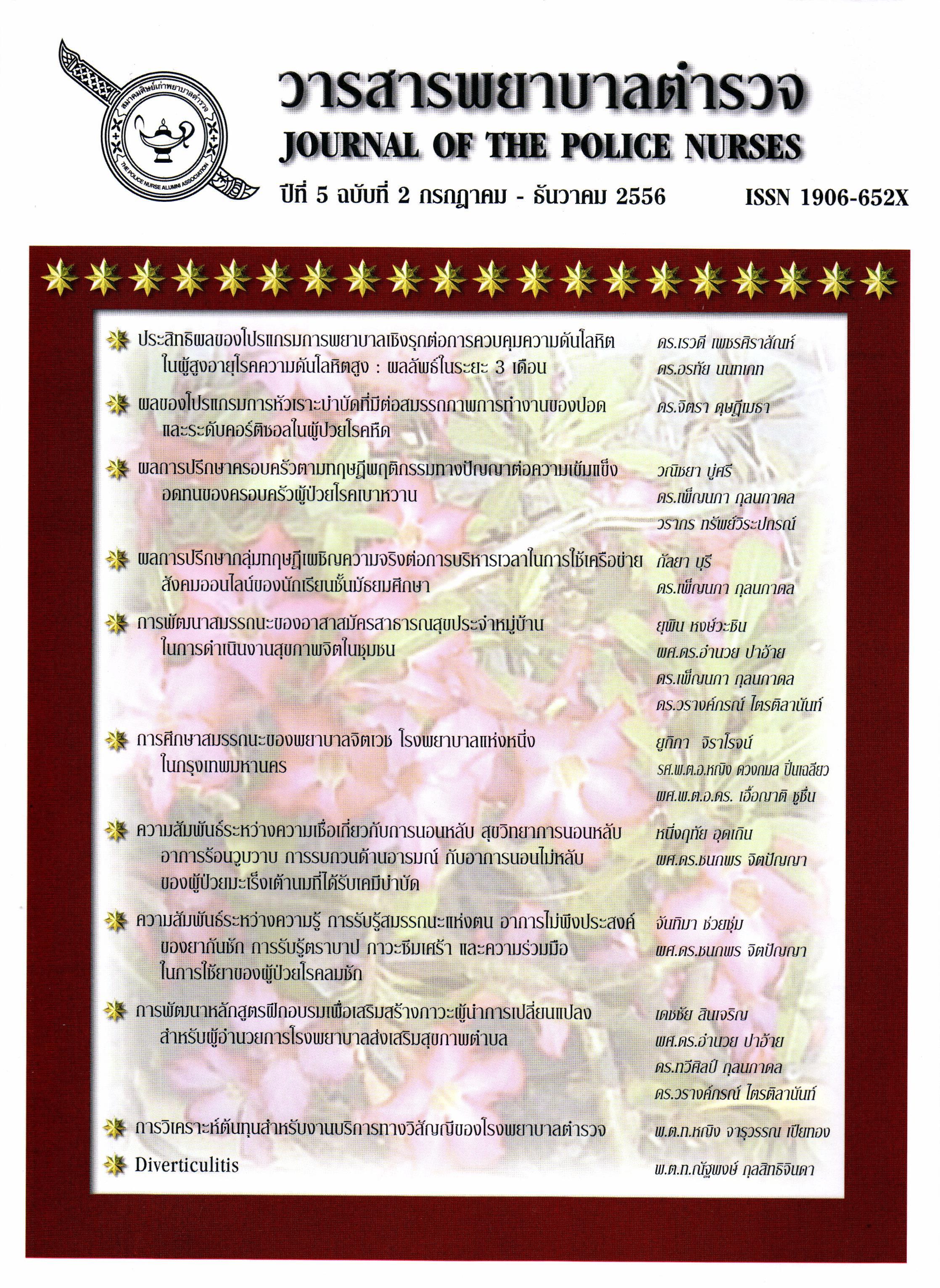ความสัมพันธ์ระหว่างความเชื่อเกี่ยวกับการนอนหลับ สุขวิทยาการนอนหลับ อาการร้อนวูบวาบ การรบกวนด้านอารมณ์กับอาการนอนไม่หลับของผู้ป่วยมะเร็งเต้านมที่ได้รับเคมีบำบัด
Keywords:
ความเชื่อเกี่ยวกับการนอนหลับ, สุขวิทยาการนอนหลับ, อาการร้อนวูบวาบ, การรบกวนด้านอารมณ์, อาการนอนไม่หลับ, Keywords, dysfunctional belief, sleep hygiene practices, hot flashes, mood disturbance, insomniaAbstract
บทคัดย่อ
การวิจัยครั้งนี้มีวัตถุประสงค์เพื่อศึกษาความสัมพันธ์ระหว่างความเชื่อเกี่ยวกับการนอนหลับ สุขวิทยาการนอนหลับ อาการร้อนวูบวาบ และการรบกวนด้านอารมณ์กับอาการนอนไม่หลับของผู้ป่วยมะเร็งเต้านมที่ได้รับเคมีบำบัด กลุ่มตัวอย่างคือ ผู้ป่วยมะเร็งเต้านมที่ได้รับเคมีบำบัด ที่เข้ารับการรักษาในคณะแพทยศาสตร์วชิรพยาบาล มหาวิทยาลัยนวมินทราธิราชและโรงพยาบาลพระมงกุฎเกล้า แผนกเคมีบำบัด จำนวน 120 คน ที่ได้มาจากการเลือกกลุ่มตัวอย่างแบบเฉพาะเจาะจง เครื่องมือที่ใช้ในการวิจัยคือ แบบบันทึกข้อมูลส่วนบุคคล แบบประเมินความเชื่อเกี่ยวกับการนอนหลับ แบบประเมินสุขวิทยาการนอนหลับ แบบประเมินอาการร้อนวูบวาบ แบบประเมินการรบกวนด้านอารมณ์ และแบบประเมินอาการนอนไม่หลับที่ผ่านการตรวจสอบความตรงตามเนื้อหาโดยผู้ทรงคุณวุฒิและหาความเที่ยงภายในได้เท่ากับ .80, .81, .87, .90 และ .92 ตามลำดับ วิเคราะห์ข้อมูลโดยการหาค่าเฉลี่ย ส่วนเบี่ยงเบนมาตรฐาน ค่าสัมประสิทธิ์สหสัมพันธ์ของเพียร์สัน
ผลการวิจัยสรุป ดังนี้
ความเชื่อเกี่ยวกับการนอนหลับ สุขวิทยาการนอนหลับที่ไม่ดี อาการร้อนวูบวาบ การรบกวนด้านอารมณ์ มีความสัมพันธ์เชิงบวกกับอาการนอนไม่หลับของผู้ป่วยมะเร็งเต้านมที่ได้รับเคมีบำบัดอย่างมีนัยสำคัญทางสถิติที่ระดับP < .01 (r=.293, .658, .490, และ .318)
คำสำคัญ : ความเชื่อเกี่ยวกับการนอนหลับ; สุขวิทยาการนอนหลับ; อาการร้อนวูบวาบ; การรบกวนด้านอารมณ์; อาการนอนไม่หลับ
Relationships among Dysfunctional Beliefs, Sleep Hygiene Practices, Hot Flashes, Mood Disturbances, and Insomnia in Breast Cancer Patients receiving Chemotherapy
Abstract
The purpose of this research was to investigate the relationships among dysfunctional beliefs, sleep hygiene practices, hot flashes, mood disturbances, and insomnia in breast cancer patients receiving chemotherapy. One hundred and twenty breast cancer patients receiving chemotherapy were recruited using a purposive sampling technique from out-patients departments, Faculty of Medicine Vajira Hospital, Navamindthradthirad University, and Phramongkutklao Hospital. The instruments used for data collection were the demographic data form, dysfunctional belief questionnaire, sleep hygiene practices questionnaire, hot flashes questionnaire, mood disturbance questionnaire, and insomnia severity index. These instruments were tested for their content validity by a panel of experts. Internal consistency reliability of each questionnaire were tested by Cronbach’s alpha and the results were .80, .81, .87, .90 and .92, respectively. Data were analyzed by using means, standard deviation, and Pearson’s production-moment correlation.
Major findings were as follows:
Dysfunctional belief, sleep hygiene practices, hot flashes, and mood disturbance were positively significant correlated with insomnia in breast cancer patients receiving chemotherapy (r=.293, .658, .490, and .318).
Keywords: dysfunctional belief; sleep hygiene practices; hot flashes; mood disturbance; insomniaDownloads
Downloads
How to Cite
Issue
Section
License
ผลงานที่ได้ตีพิมพ์แล้วจะเป็นลิขสิทธิ์ของวารสารพยาบาลตำรวจ















